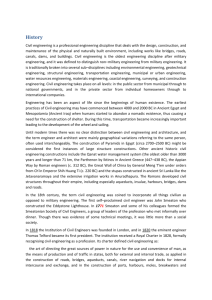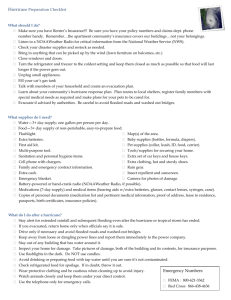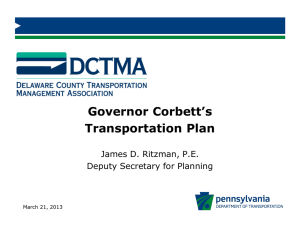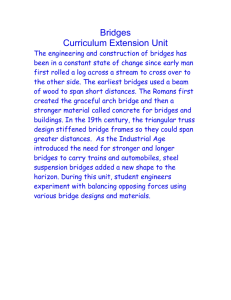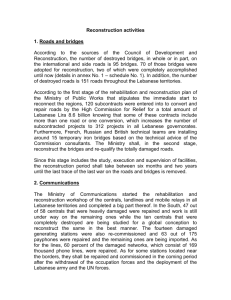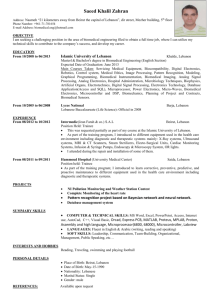Lebanon Road Assessment Additional Information
advertisement
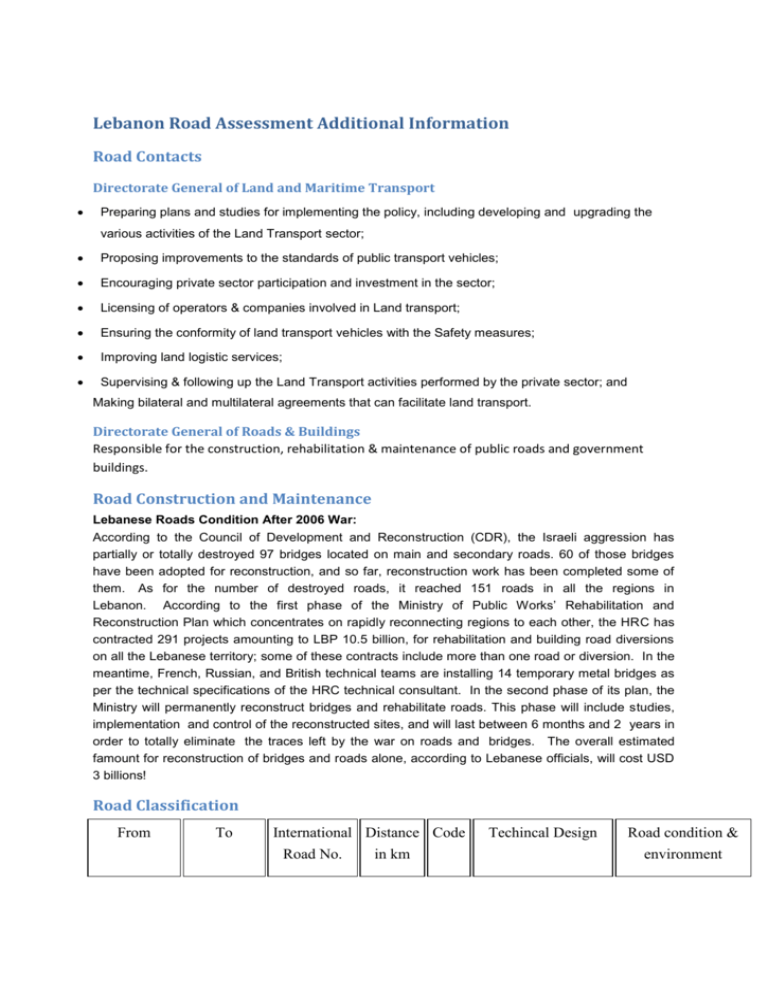
Lebanon Road Assessment Additional Information Road Contacts Directorate General of Land and Maritime Transport Preparing plans and studies for implementing the policy, including developing and upgrading the various activities of the Land Transport sector; Proposing improvements to the standards of public transport vehicles; Encouraging private sector participation and investment in the sector; Licensing of operators & companies involved in Land transport; Ensuring the conformity of land transport vehicles with the Safety measures; Improving land logistic services; Supervising & following up the Land Transport activities performed by the private sector; and Making bilateral and multilateral agreements that can facilitate land transport. Directorate General of Roads & Buildings Responsible for the construction, rehabilitation & maintenance of public roads and government buildings. Road Construction and Maintenance Lebanese Roads Condition After 2006 War: According to the Council of Development and Reconstruction (CDR), the Israeli aggression has partially or totally destroyed 97 bridges located on main and secondary roads. 60 of those bridges have been adopted for reconstruction, and so far, reconstruction work has been completed some of them. As for the number of destroyed roads, it reached 151 roads in all the regions in Lebanon. According to the first phase of the Ministry of Public Works’ Rehabilitation and Reconstruction Plan which concentrates on rapidly reconnecting regions to each other, the HRC has contracted 291 projects amounting to LBP 10.5 billion, for rehabilitation and building road diversions on all the Lebanese territory; some of these contracts include more than one road or diversion. In the meantime, French, Russian, and British technical teams are installing 14 temporary metal bridges as per the technical specifications of the HRC technical consultant. In the second phase of its plan, the Ministry will permanently reconstruct bridges and rehabilitate roads. This phase will include studies, implementation and control of the reconstructed sites, and will last between 6 months and 2 years in order to totally eliminate the traces left by the war on roads and bridges. The overall estimated famount for reconstruction of bridges and roads alone, according to Lebanese officials, will cost USD 3 billions! Road Classification From To International Distance Code Road No. in km Techincal Design Road condition & environment Number Platform Age/ Enviroment of Lanes availabilty year (y/n) Dabousseyah cross border (SyriaLebanon) Aboudeyah M51 cross border (LebanonSyria) 18 1H 2 N >20 Coastal Aboudeyah Tripoli M51 5 1H 2 N >25 Coastal Tripoli Beirut M51 83 1H 4 Y >20 Coastal Beirut AlNaqoora M51 104 1H 4 Y >20 Coastal Jedeidah Al- M30 6 1H 4 Y >20 Mountainous cross border (SyriaLebanon Massnaá cross border (LebanonSyria) Al-Massnaá cross border (LebanonSyria) Beirut M30 53 1H 4 N >25 Mountainous 269 1H cross border (LebanonSyria) Total Lebanon International Road Distance Road Inventory Classification International Roads Width/meter 10-14 Length/ km 269 Primary Roads (highways) 10-14 261 Primary Roads 8-10 1650 Secondary Roads 5-8 1340 Local Roads 4-6 2810 Total 6330 Bridges Lebanon has a considerable number of bridge networks all over the country. In 2006 war with Israel, the number of 91 bridges has been destroyed. According to final information from the Council of Development and Reconstruction (CDR) and the Ministry of Public Works and Transportation, the number of partially or totally destroyed bridges located on main and secondary roads reached 91 bridges, out of which 73 have been adopted for reconstruction with the rest being financed by HRC. CDR is currently handling the reconstruction of 49 bridges, 17 of which are in the South, 2 in Nabatieh, 24 in Mount Lebanon, 3 in Bekaa and 3 in the North. The Ministry is handling 42 bridges, 12 out of which are in the South, 13 in Nabatieh, 2 in Mount Lebanon, 9 in Bekaa and 6 in the North. Reconstruction activities on those bridges have gone a long way as 43 have been completed while work is expected to be finalized in the rest of the bridges by July 2007, except for Mudairej and Damour Archeological bridge on which works need a longer period of time. In this concern, the HRC has assigned, through the Ministry of Public Works and Transportation, the rehabilitation of 219 roads and the building of 44 road diversions and 21 passage ways to ensure traffic flow on all the Lebanese territory. Accomplished works totaled around LBP 5 billion, while total contracted works will exceed the amount of LBP 16 billion. Transport Corridors Lebanon has three operating corridors with Syria. These corridors are: 1- Al Masnaa- Al-Jeidah border entry point (at the eastern part of Lebanon) 60 km from Damascus and 110km from Beirut. This is the main corridor that connects the Lebanese and Syrian capitals. 2- Al-Areedha-Tartous border entry point (at the northern part of Lebanon). This corridor is located at the coastal area and widely used for cargo transportation between Syria and Lebanon. It is 45km far from Tartous at the Syrian side and 170km far from Beirut at the Lebanese side. 3Al-Abodeyah - Al-Dabouseyah border entry point (at the northern part of Lebanon). This corridor is connecting Homs governorate (from the Syrian side) with Tripoli Governorate (from the Lebanese side). It is widely used for cargo transportation (especailly in the in-transit cargo to Iraq and has the same distance of the second one.
